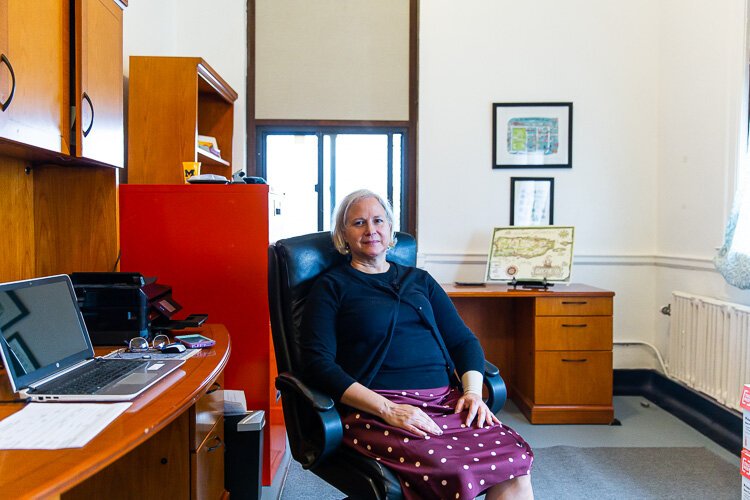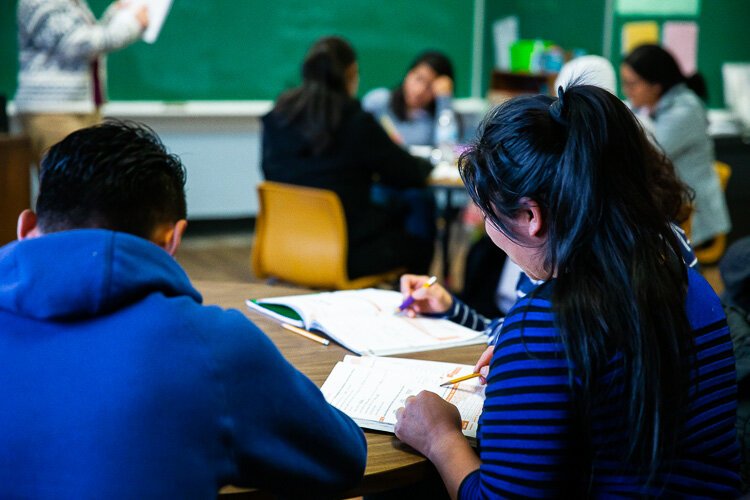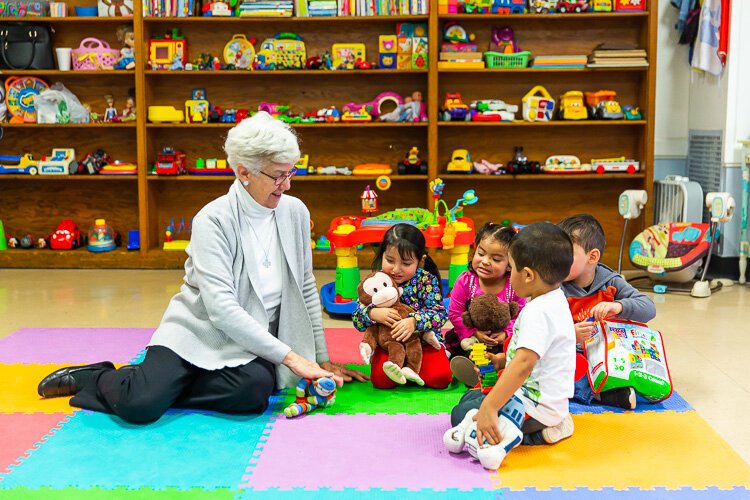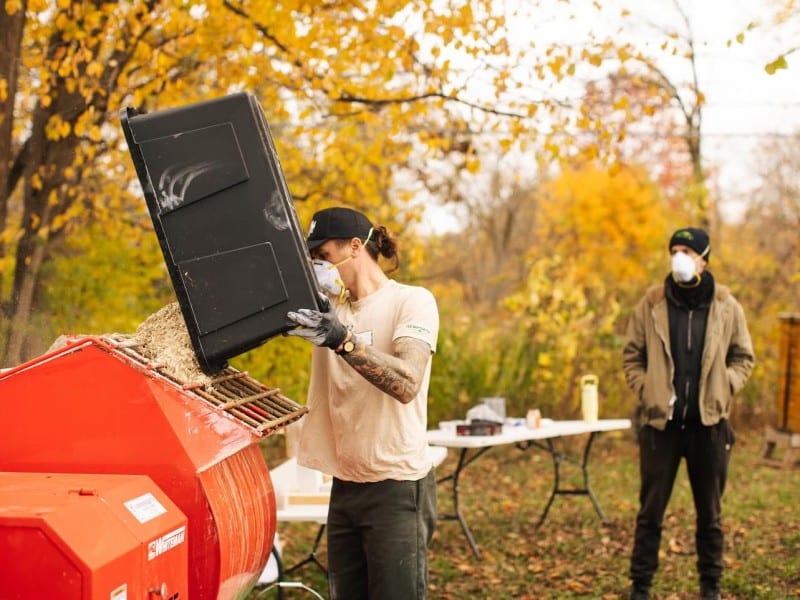La Casa Guadalupana is making Spanish-focused adult ed a reality in Southwest Detroit
La Casa Guadalupana offers Adult Basic Education (ABE) and General Education Diploma (GED) classes four days a week. Both are taught in Spanish.
Several days a week, Jessica Bravo makes a trip to a two-story red brick building on Central Street in Southwest Detroit to attend a series of classes that are helping her turn a new corner in her life.
Originally from Mexico, the 35-year-old mother now makes her home in the Motor City. Although she never graduated high school, Bravo is working to change that by attending a local school called La Casa Guadalupana. Located on the second floor of that red brick building on Central, it offers Spanish language instruction for adults. And for Bravo, who doesn’t speak fluent English, that’s a blessing.
“This is a dream come true, me coming here. I get a lot of support,” she says. “It’s a very beautiful experience. Everybody here is very respectful.”
Right now, Bravo has enrolled in social studies and math classes at La Casa, courses that will help her earn a high school equivalency certificate. For her, the classes represent more than just the means to attain a long-held personal goal or improve her employment opportunities.
“One of my kids wants to graduate from high school. The other one doesn’t care,” she says. “I want to be an example so that they can have a better life.”
Launched five years ago, La Casa Guadalupana offers Adult Basic Education (ABE) and General Education Diploma (GED) classes four days a week. Both are taught in Spanish, as more than 50 percent of the population in the surrounding community there are Hispanic. ABE and GED courses take place from 9 a.m. to 1 p.m. Monday through Thursday and from 6 to 8 p.m. on Mondays and Wednesdays.
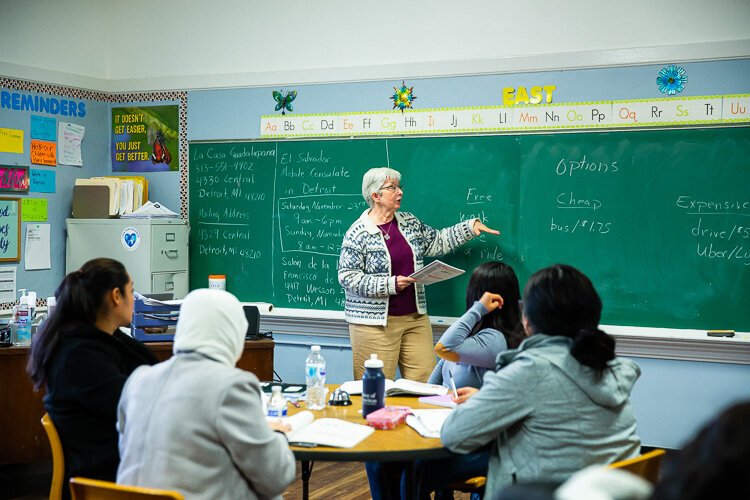
The school also teaches English as a Second Language (ESL) courses for those who wish to improve their English for employment purposes or to pursue opportunities in higher education. During the afternoon, tutoring is also available to help school-age children with homework with the goal of improving math and reading skills. Beyond that, the school also hosts a variety of workshops and presentations on topics like women’s health, immigration, domestic violence, nutrition, finances, and employment protection.
“Our classes are very student-centered, each one learns at their own pace,” says Dr. Lourdes Torres-Monaghan, La Casa’s director. “Teachers help students understand and acquire knowledge from their mistakes. Each person has their own life experience and uses it to make connections with the academic topics they are covering.”
Building La Casa
Now an independent nonprofit, the school began its existence as a project of the Catholic Church’s Our Lady of Guadalupe parish, which serves Southwest Detroit’s Hispanic community.
In 2014, the Rev. Marie-Elie Haby, then the pastor of the parish, began laying the groundwork for the program with the assistance of Sister Marie Benzing, a nun with the Sisters of St. Joseph and retired teacher with more than 45 years of experience with elementary and middle school students. Three years prior, Benzing helped launch a local tutoring program called El Centro de San Jose that had proven to be quite popular with local youth; inspired by that example, the pastor became interested in exploring other ways to bring educational resources to the community.
“The pastor and I had talked many times about wanting to do something for adults we knew had not had the opportunity to complete their education,” says Benzing. “So he established La Casa Guadalupana as a nonprofit, and I applied to my congregation and they gave us some money (to help start the school).”
They selected the grounds of a shuttered former Catholic school to be the site of the new school, and after some renovation work, La Casa Guadalupana opened its doors in March of 2015. It was decided that the coursework would be in Spanish, so students could focus on learning skills without having to stress out about what the teacher was saying. The curriculum and materials for the program were obtained through the Mexican Consulate.
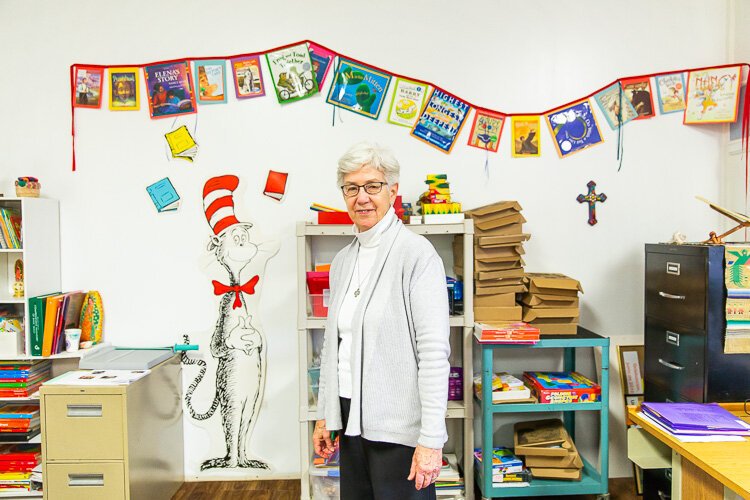
To start things off, a director and four teachers were hired to teach ABE (which covers skills for grades 1-6 and 7-9) and GED exam prep courses. Sixty students enrolled for the first session of classes, which then took place just three days a week. That September, classes were expanded to four days a week, morning and evening options were made available, English classes were added, and child care was made available for student parents. In 2017, the Centro de San José tutoring program merged with La Casa’s programming.
Over time, interest in the school has snowballed. The school’s current enrollment now stands at 200 students. In addition to that, respectable numbers of people enrolled in the programs have gone on to complete their courses of study. From 2016 to 2019, 31 students have graduated via the Mexican Consulate with GED certifications and during the same period, 56 have earned ABE certifications. “We’ve been blessed,” says Benzing.
“We have families that have been with our programs for five or six years. It is so satisfying for me to work here and to help support them in any way possible and to see how they progress.”
Common paths, shared goals
Although the students at La Casa are by and large Hispanic, there’s still quite a bit of diversity among them.
“You will hear English and every variation of Spanish because we have students with heritage from all regions of Latin America,” says Dr. Torres-Monaghan.
That said, nearly all of the ABE and GED students come from similar paths.
“As children, they lived in rural areas, far from the nearest public school or their parents did seasonal work so that they did not stay in the same school for very long,” she says. “They might have started school, even done well at it, but life events prevented them from completing their education.”
Regardless of their backgrounds most of La Casa’s students are dedicated to making better lives for themselves and their families.
Keisla Cuebas was born in Puerto Rico and came to Detroit when she was 5 years old. She dropped out of high school at 16 years old, when she had her first son. Like Bravo, she’s enrolled in Math and Social Studies classes and working towards a GED certificate.
“It means a lot,” she says. “I’m really progressing with math. I can help my kids with their homework, which I couldn’t do before and I want to do bigger things for myself.”
Educational horizons
Despite the success of La Casa Guadalupana, the school is not without its challenges. The increase in enrollment has required an increase in staff. There are now 16 part-time employees, but it’s been difficult to find bilingual instructors in the area. This issue has been partially remedied with a volunteer crew made up of retired teachers and college students from Wayne State and the University of Detroit-Mercy.
There’s also been a high turnover with directors – four since the program began. Dr. Torres-Monaghan, who previously taught at Marygrove College, began her involvement as an instructor and was asked by the organization’s board to step into her new role after the previous director announced they were leaving.
Related to the staffing situation is the ever-present demand for financing. Even though La Casa runs on a shoestring budget, it still requires around $100,000 a year to keep the operation afloat. Although the parish’s current pastor, the Rev. Adalberto Espinoza, is supportive of the school, La Casa is now an independent 501(c)(3) nonprofit and must raise its funding through grants.
“We feel like we’ve been really blessed with people who are interested in our program who help to support us,” says Benzing, adding, “but we continue to look for partnerships and ways to grow the program.”
So even as it grows in interest and enrollment, La Casa faces an uncertain future. With that in mind, the school is preoccupied with finding a sustainable path forward so it can continue offering valuable educational resources to the community.
“We’d like to have a stronger financial base, so we know we have a future. It’s important for our students,” says Benzing. “If we weren’t here, many would probably drop out of their educational efforts.”
